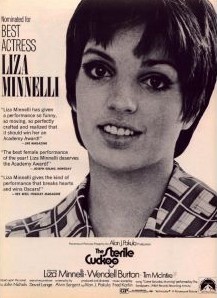by Camila Henriques
 Pookie Adams is one of a kind. When we first meet her, she’s on her way to college and is the type of quick witted character that could very well be the Adam’s rib to the Amy Sherman-Palladino girls we have loved for the past two decades. With her round glasses and pixie haircut, Liza Minnelli’s Pookie is easy to love in Alan J. Pakula’s The Sterile Cuckoo. As the film turns 50 today (!), it’s magical to witness how Judy and Vincente's offspring always had a sparkle of her own, capable of turning a manic pixie dream girl archetype into a layered character that rightfully earned her that first Oscar nod.
Pookie Adams is one of a kind. When we first meet her, she’s on her way to college and is the type of quick witted character that could very well be the Adam’s rib to the Amy Sherman-Palladino girls we have loved for the past two decades. With her round glasses and pixie haircut, Liza Minnelli’s Pookie is easy to love in Alan J. Pakula’s The Sterile Cuckoo. As the film turns 50 today (!), it’s magical to witness how Judy and Vincente's offspring always had a sparkle of her own, capable of turning a manic pixie dream girl archetype into a layered character that rightfully earned her that first Oscar nod.
Liza was by no means a newcomer when The Sterile Cuckoo came out. A child of Hollywood, she famously grew up on hotels and movie sets and, at the age of 17, made her debut in an off-Broadway play and did a number of performances alongside mama Garland...
Two years later, she got a Tony Award for “Flora and The Red Menace”. Around that same time, she performed in nightclubs and recorded albums. She was actually a seasoned performer when the film industry caught sight of her wide eyed gaze: her feature film debut came in 1968, and, a year later, she became Pookie Adams.

Cuckoo has the aura of other coming of age and/or /college-y films like Love Story and The Graduate. There’s the uncertainty and the fear, but also a fake self confidence of those who have yet to really experience life. Pookie and Jerry (Wendell Burton) are like two extremes in that sense - she doesn’t want to fit with the “weirdos” (so she says) and he is caught up between everything in his life. The confusion that is characteristic of the whole going-away-to-college life change is framed by the repetitive score by Fred Karlin and his and Dori Previn’s Oscar nominated song “Come Saturday Morning”.
The noise only goes away when Pookie is comfortable enough to show her vulnerability, and here is where Minnelli’s performance goes from a classic “star is born” kind of turn (no pun intended) to one of an actress mature beyond her years and capable of crafting something more substantial than the cutesy/awkward trope of that girl hiding behind her glasses. We can see that with stunning clarity in at least three moments of Pakula’s feature:

-
When Pookie and Jerry go to the cemetery. "Sometimes you have to get away from the noise, you know", she says, as the music basically disappears (and then shows up again in a softer vibe). That’s when we see that she uses humor as a shield (‘how old were you when you mother died?’ ‘a minute! my first victim!’) and her no fuss relationship with death.
-
Then, when the couple has sex for the first time. Once again, the scene is met with no music, as if to emphasize the self-consciousness of it all. And as our girl tries to break the ice and come in with the funny, we understand she isn’t used to being the pretty girl. The surprise and discomfort in her face as she hears Jerry say her body is beautiful is another moment of brilliance in Liza’s performance. Her eyes take center stage and, even though she tries to hide them with her specs, we can't miss them.
-
Finally, the phone call scene. This moment is a showcase of Liza’s talents as a dramatic actress. Four years before wowing the world with her Sally Bowles in Cabaret (a personal favorite of mine and many members of TFE), she doesn’t got for the easy teary eyed Oscar clip - even though that is arguably her most remembered scene in this film -, and, once again, lets her eyes do the talking as we see the need, heartbreak and desperation of a misfit.
When The Sterile Cuckoo and her subsequent Oscar nomination came out, Liza didn’t have her mother to share it with. Judy had died a few months earlier. The film wasn’t all that embraced by the Academy, with just two nods - the second being for the original song by Fred Karlin and Dori Previn -, but the Minnelli nomination was more than a mere “welcome to the club” honor. She was raved from the get go, in film, and on stage, and as a recording artist.
That Oscar year, she went up against another Hollywood child, Jane Fonda (They Shoot Horses, Don’t They), Golden Globe winner Geneviève Bujold (Anne of a Thousand Days), Jean Simmons (The Happy Ending) and eventual winner Maggie Smith (The Prime of Miss Jean Brodie). With the exception of Simmons, fifty whole years later we still have four of these nominees, with two of them (Fonda and Smith) working steadily. Isn't that great?

As we all know, Liza wouldn’t sweat that loss to dame Maggie, as Sally Bowles was waiting in the wings. But, even though her work in Fosse’s masterpiece is one the great film performances of all time, it shouldn’t eclipse her turn here as Pookie Adams. If you give The Sterile Cuckoo a chance you'll see that it’s impossible not to fall in love with this girl and her journey of self discovery through heartbreak.